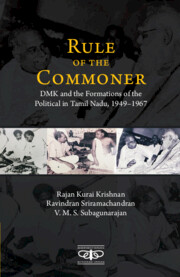7 - Counter-Narratives
Published online by Cambridge University Press: 15 June 2022
Summary
The extent of diffusion of the Hindu Puranic corpusover a couple of millennia among the people of TamilNadu is inestimable. Innumerable would be the extentof local variations and interpretations ascirculated through folk performances, oralnarratives, and many a mode of textualizations frompalm leaves to early access to print during theeighteenth and nineteenth century. Hence, it is hardto hazard a guess whether a commoner would, in themiddle of twentieth century, be aware of, say forexample, the story of churning of the “ocean ofmilk” to extract amṛ́ta, or nectar, a signal Puranicincident, is difficult since a lot would depend onwhat kinds of access he or she had to folk culturalforms and oral narrative traditions, let alone printliterature. We could think of the example ofMenocchio, the sixteenth-century miller of Italy,whose cultural world was so painstakingly laid outto us by Carlo Ginsberg, for thinking of whatconstitutes a common person's view and knowledge ofthings, say as he or she is immersed in “popularculture” (Ginzburg 1992). Unlike the Italian case,much of what informed a commoner in Tamil Nadushould be oral and folk narratives, occasionally, ifever, supplemented by reading due to the high rateof illiteracy reported in mid-twentieth century.What notion of the asura of the puranic lore the commonermight have carried is a matter of speculation. Wecan however be certain that he or she had a rich andvaried sedimentation of cultures to choose from. Itis in such an open field of imaginations that theDravidianists sought to make a case for theassertion of the asuras over the allegedly unjustcharacterizations the Puranic imagination had castthem in.
If we, the authors, were to speak of our ownassimilation of the cosmic scheme of the Puranas,not from studying the Sanskrit texts or the works ofIndologists but as people who had been immersed inpopular culture as we grew up, we should first notethat there were three worlds to contend with. TheDevaloka is the heavenly abode where the devas resided. The Bhulokais the world of the humans. The Patalaloka, thenetherworld, is where the asuras and rakshasas lived.
- Type
- Chapter
- Information
- Rule of the CommonerDMK and Formations of the Political in Tamil Nadu, 1949–1967, pp. 141 - 158Publisher: Cambridge University PressPrint publication year: 2022

